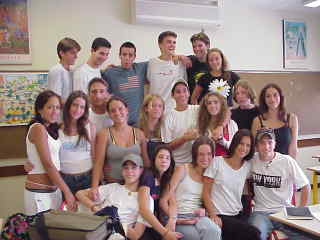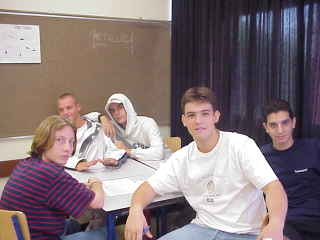Summary
of Discussion
One
of us said he hates another person because he spat on his face. He
now wants to fight the other every time he sees him, he feels like
breaking his face and says this would give him a great satisfaction.
Somehow he would get even.
We
believe that these situations in a bigger scale and involving more
people are the generators of wars. Take for instance what is happening
in Israel and Palestine nowadays. And there's only one way to stop
it: not to answer back violently an act of violence, do not answer
to another one's provocation. The peaceful way would be to reason
the argument out. Another way to stop violence is when you act in
peace towards the others.
If
you compare the violence there is at school to the violence outside,
we must say there's almost none here. However, people do fight and
sometimes take the fight outside. So, the first thing to do is to
respect the others...if we have less violence at school, we are learning
to have less violence out of it. We cannot say our school is violent
- we do not have people with guns or knives, which is what people
usually connect with violence. However, violence may be present in
many forms: physical ( slapping, pulling the hair, kicking, scratching,
biting, spitting), verbal (swearing, shouting, bullying, screaming)
and mental (some students/teachers sometimes humiliate the others
by comparing the quality of their academic work , are authoritarian
without giving people a chance to dialogue, or threaten the others,
we see some people sometimes are discriminated for their religion,
social status, height, weight or even because of their intelligence
or lack of it). However, whenever this happens, most of the time some
action is taken against it. Either by the students themselves who
try to reason with the people involved or separate a fight or by the
school directors/teachers who apply a punishment after a long talk
with the people involved. The punishment may vary between a simple
warning to an exclusion from school for a day or two...and sometimes
if it's really serious, permanently.
We
believe that respect is the key word for peace. Where there is respect,
no matter if you are a student , a teacher or a director, there is
trust. If you trust you have an attitude for peace. The points of
the manifesto are just how people could behave. Unfortunately, for
many all over the world, a dialogue, listening to what the other has
to say and respect it, seems more difficult than slapping, raising
the voice or humiliating. We believe peace is something we all want,
but at the same time, it asks from us a lot of control over our reactions
and impulses.
22
people took part in these discussions: Patrick, Guy, Philipe, Baltazar,
Laetitia, Maria Fernanda, Aurelia, Kenza, Lydia, Tanguy, Tatiana,
Fernando, Kevin, David, Patrick F. , Gustavo, Rita, Bianca, Alix,
Deborah and Nathalie.

